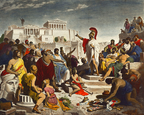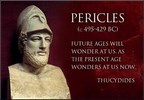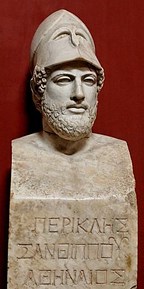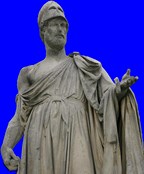Pericles was born in 495BC or according to others historians in 490BC in the municipality of Cholargus. His father was Ksanthippos, a rich Athenian who came from the priestly Vouzigos lineage. Also, Ksanthippos was one of the brave leaders of the Athenians during the Mycale’s battle in 479 BC against the Persians. Pericles’ mother was Agaristi, the niece of Clisthenes, founder of the Athenian Democracy.
As happens with every great man, the born of Pericles is accompanied by a myth. It says that his mother, Agaristi, before to born him, saw a dream in which instead of child she born a lion. During these ancient years a dream like this was heralding the born of a man who would be the first among many people. And exactly that is happened in the case of Pericles.
Pericles came from an aristocratic lineage so this helped to get the best possible education by teachers like Zenon, Anaxagoras and Damon for the music. His teachers, especially Anaxagoras, obviated him from the superstitions and taught him to deal with the natural phenomena rationally, to be objective with the vicissitudes of life, broadened his spirit and developed his discretion. Pericles was a man greatly intelligent, gentle, self-possessed and serious but this which made him really popular to the Athenians was its ability to be rhetoric. He was a great rhetorician, he was speaking with such calm and convincing that the audience was captivated from his words. Thanks to this rhetoric skill and his calmness the Athenians called him Olympian. A very characteristic fact is when the king of Sparta asked Thucydides (the political opponent of Pericles) if he had fought with Pericles, Thucydides answered that he hadn’t even thought to fight with him as was sure that will be defeated. So the Spartan king thought Pericles was a very strong man but Thucydides clarified to him that Pericles was strong in words no physically. He honestly mentioned ‘’he will defeat me with his mouth, even if i win, he will achieve to convince the audience that he won! “
Pericles is known also as the creator of the Golden Age of Athens (or the Golden Age of Pericles). Many characterize him as a genius. During the years of his governing, he achieved to make Athens a city of culture and art. Many philosophers from different parts of Greece wanted to go to Athens and teach there. Rhetoricians fascinated the public and architects were constructing magnificent buildings. Artists, sculptors and painters created workshops. Writers and poets, like the greats Sophocles and Euripides wrote tragedies, as the theater was the favorite entertainment for all the people. As for the art, it is said that it was great contribution of Pericles’ wife, Aspasia of Miletus which besides her breathtaking beauty had a deep artistic training.
Pericles and politics
When he took over the leadership of the city he firstly dealt with internal politics and proposed measures that strengthened the democracy. He decreased the power of the Court of Cassation which was considered as oligarchic institution and then he transferred the powers to the Ecclesia (principal assembly of the democracy of ancient Athens) and to the court of Heliaea (supreme Athens court). By lot also was the choice of the lords, to have a chance of success all the citizens and not just the wealthy and those with the most influence. To reinforce the participation in politics and for the financially weaker classes, Pericles established the institution of mercenaries, in simple words gave salary to the public men like those to the court members. With these moves, Pericles really gave great power to the Athenian citizens and laid the foundations of democracy. As leader of Athens tried to help the Athenians who were in difficult economic situation. For this purpose was taking money from the public treasury and gave it to poor families. He also instituted a law through it the poor Athenians had the privilege to watch theatrical dramas totally free of money as he had faith to the power of art like a healthy entertainment and not only for the rich families but for all without exception. For Pericles, art was something absolutely necessary for the education and the configuration of completed humans who can perceive the beauty which refines and challenges the expression of the higher emotions. It said that during the Golden Age of Pericles the percent of the poor Athenians were the minimum ever.
The Golden Age of Pericles came to its end when the Peloponnesian War started. The spring of 431BC, Archidamus, the king of Sparta invaded Attica with a large army which burnt everything in its wake. After one year of the War starting,the bones of the first dead soldiers came to Athens. The burial day, Pericles pronounced the worldwide famous ‘’Funeral Oration’’ as recorded by Thucydides. This speech is a real monument for the art of oration. The same years attacked the city a fatal epidemic disease. The death started to spread everywhere. Pericles lost his sister and his two children, especially the death of his son Paralos convulsed him. Exhausted from the deaths and sick himself, Pericles, appeared to the court to defend himself and to convince the judges that Sparta first started the War. The court finally absolved him but the Athenians didn’t trust him and didn’t vote for him anymore for 30 years. When the situation in Athens started to improve, Athenians elected again Pericles and to express their love and gratitude gave to his son from Aspasia civil rights (to be someone Athenian citizen and to have civil rights had to come from both Athenian parents).
Only few days after his election, Pericles seriously sick and exhausted physically and mentally, didn’t make it and died. With Pericles died along and the Golden Age of Athens and started the decline of the city. Pericles was sure one of the greatest men who ever lived in Greece.



